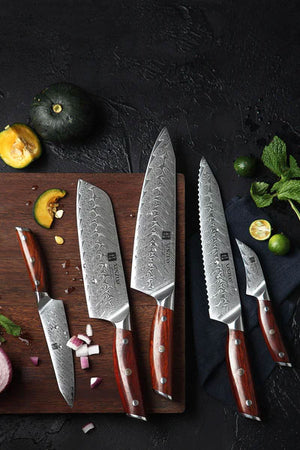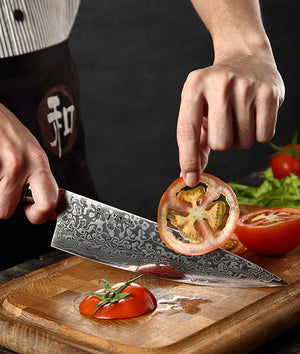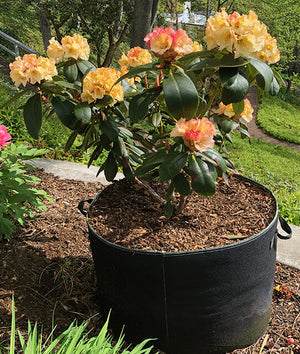Damascus Butcher Knife
A butcher knife isn’t a tool that everybody needs to have in their kitchen. While it can be used for some types of carving, cutting, slicing, and deboning, its size and strength make it specifically useful dealing with large pieces of meat – that is, often, whole animals. And, while some people may do this kind of thing at home, it’s more common for butcher knives to be used by proper butchers, people that live on farms, or chefs that... Show More
A butcher knife isn’t a tool that everybody needs to have in their kitchen. While it can be used for some types of carving, cutting, slicing, and deboning, its size and strength make it specifically useful dealing with large pieces of meat – that is, often, whole animals. And, while some people may do this kind of thing at home, it’s more common for butcher knives to be used by proper butchers, people that live on farms, or chefs that deal with a lot of meat.
But, a Damascus butcher knife isn’t just any old butcher knife. When you have a blade made from Damascus steel, it tends to be stronger, sharper, and less likely to chip and corrode – ideal for a butcher knife.
So, if you’re looking to purchase a butcher knife, we’d absolutely recommend one with a blade made from Damascus steel. But before you go on to browse our collection, let us tell you a little bit more about Damascus steel – what it is, where it comes from, and how it’s made – and why we recommend buying a Damascus steel butcher knife.
Damascus Steel: What it is, Where it Comes From, and How It’s Made
As we mentioned, Damascus steel is an extra strong material from which knife blades are made – it’s a complex composition of different types of metals.
However, when we refer to Damascus steel these days, we’re actually referring to a modern rendition of an ancient product. Authentic Damascus steel comes from ancient Syria – it was used for not only kitchen knives, but combat swords and other weapons too. But, the method by which Damascus steel was made back then was lost over time, thus, the way we make it today is an estimation based on artefacts from this period.
These days, the process used to produce Damascus steel is called pattern welding. It involves a timely process of layering many different types of metal up on each other and using different types of heat treatments to bind them. From there, the blades are carved out, and the effect of the layering is evident in the wave-like pattern that appears on the face of the knife. Because they all undergo the layering process, the pattern on each blade is unique.
The reason behind having multiple layers of different metals is that it improves overall strength and rigidity, decreases the likelihood of chipping, and allows for increased sharpness.
Why We Recommend a Damascus Butcher Knife
So, why is Damascus steel recommended for a butcher knife?
Well, as we said, butcher knives need to be super strong and sharp, because they cut through dense meat, bone, and Cartlidge. Thus, Damascus steel is the perfect material it’s strong in both of those departments.
Furthermore, it’s also more durable than most other materials from which blades are made, so it’s ideal for a knife that’s going to go through a lot!
So, if you want a strong, durable, and sharp butcher knife that’ll get the job done, shop our Damascus butcher knife collection, our purchase yourself a full Damascus butcher knife set, today.
Show Less
-
Original price $134.95Original price $134.95 - Original price $134.95Original price $134.95Current price $89.50$89.50 - $89.50Current price $89.50| /
HEZHEN B38H 67 Layer Japanese Damascus Butcher Knife White G10 Handle
In stock10Cr15CoMoV Steel Core cutting edge for edge retention and sharpness. Outer layers of SUS410 Damascus Stainless for corrosion resistance. 67-total...
View full detailsOriginal price $134.95Original price $134.95 - Original price $134.95Original price $134.95Current price $89.50$89.50 - $89.50Current price $89.50| /Save 34% Save %









